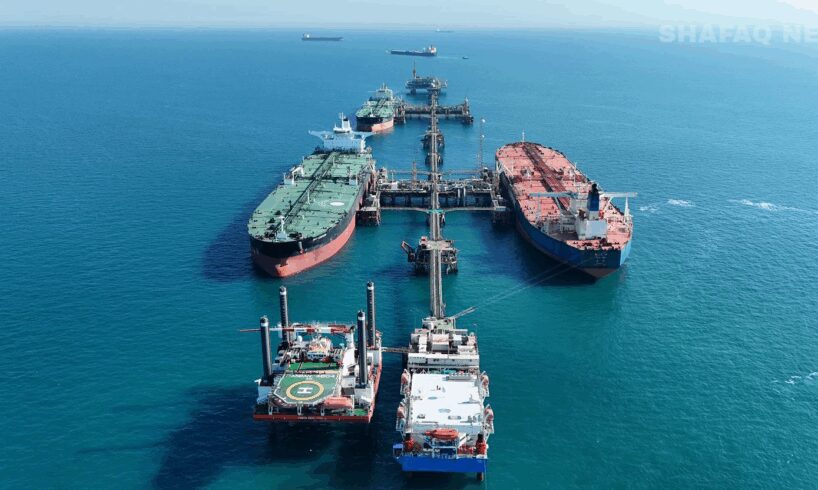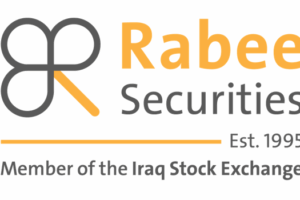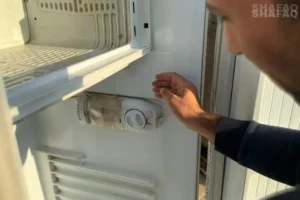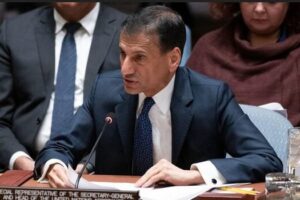
Shafaq News
US sanctions announced in September against
Iraqi-Kittitian businessman Waleed al-Samarrai have once again drawn Iraq into
the debate over Iranian sanctions evasion. Washington accused al-Samarrai’s
network of passing off Iranian crude as Iraqi exports, generating hundreds of
millions of dollars for Tehran and its affiliates.
The case highlights a broader issue raised by
American officials: that Iraq’s geography, energy infrastructure, and political
environment make it a natural pathway for oil smuggling schemes, despite
Baghdad’s repeated denials.
Methods Of Smuggling And Disguise
Over the past decade, Iran has developed a
complex set of techniques to move crude and fuel products despite US sanctions.
According to the US Treasury and industry monitoring firms such as Kpler and
Vortexa, these methods include blending Iranian crude with barrels of Iraqi
origin, producing certificates of origin that identify the cargo as Iraqi, and using
shell companies registered in jurisdictions such as the Marshall Islands or
Liberia to obscure ownership.
Maritime deception plays a central role.
Tankers often conduct ship-to-ship transfers in international waters, with some
vessels temporarily disabling their Automatic Identification Systems (AIS) to
conceal movements or broadcasting manipulated coordinates. Such practices make
it difficult to trace the source of the oil, particularly in the northern Gulf,
where Iraqi and Iranian waters are geographically close.
This activity has been linked to what the US
Treasury describes as Iran’s “shadow fleet,” a collection of older tankers
acquired specifically for sanctions-evasion purposes. These ships frequently
change flags, operate without standard insurance, and rely on opaque ownership
structures. The result is an international network designed to blur
accountability and hinder enforcement.
Iraq’s Exposure
For Iraq, the challenge lies in how these
operations intersect with its own oil sector. Iraq shares narrow Gulf waters
with Iran, and tankers operating just beyond territorial limits can conduct
transfers outside the immediate reach of Iraqi oversight. Although the State
Oil Marketing Organization (SOMO) insists it employs advanced tracking systems,
including those provided by the US firm Kpler, enforcement responsibilities are
divided between SOMO, naval forces, and port authorities. This fragmentation
can create space for illicit activity.
Iraq is also exposed through transnational
business networks. Figures such as al-Samarrai or, earlier, Iraqi-British
national Salim Ahmed Said, have been sanctioned by Washington for allegedly
operating schemes that blended Iraqi and Iranian cargoes. These individuals
typically make use of offshore entities and global shipping registries,
limiting Iraq’s ability to assert direct jurisdiction.
Oil expert Nabil al-Marsoumi, speaking to
Shafaq News, noted that suspicions have centered on the al-Qayyarah oil field,
where only a small fraction of production is consumed domestically and the
remainder could potentially be mixed with Iranian crude to bypass sanctions. He
also pointed to Berth 41 at Khor al-Zubair as a focal point for suspected
trafficking of crude and fuel oil, highlighting areas where Iraq’s exposure is
most acute.
Baghdad’s Denials And Enforcement
SOMO has categorically rejected accusations
that Iraqi crude has been mixed with foreign supplies. In early September, its
director-general, Ali Nizar al-Shatari, stated that exports are monitored “from
loading to delivery” through international tenders and transparent banking
channels. He argued that the mere presence of unfamiliar tankers in regional
waters “does not necessarily indicate smuggling.”
Baghdad has also highlighted its enforcement
role. In August, Iraqi naval forces detained a Liberian-flagged tanker during
inspections near Basra. Officials described the operation as part of a broader
crackdown on fuel smuggling and said the case was referred for judicial review.
Iraqi authorities did not state that the incident was linked to Iranian oil
smuggling, and Iranian officials did not comment on the detention.
Despite these assurances, the US Treasury
Department has reiterated that sanctions-evasion networks continue to exploit
Iraq’s oil ecosystem, stressing that revenues from these operations benefit
Iranian entities, including the Islamic Revolutionary Guard Corps–Quds Force.
Al-Marsoumi also observed that SOMO has
recently withdrawn from transporting crude from production fields to Khor
al-Zubair, leaving this responsibility to oil companies. He suggested the move
was intended to distance the organization from operational controversies linked
to product leakage and allegations of smuggling through southern ports.
Evidence Of Disguised Flows
International trade data has added complexity
to the debate. Chinese customs records in recent years have shown imports of
“Iraqi” oil exceeding Iraq’s officially declared exports by around 100,000
barrels per day. Analysts such as TankerTrackers and Vortexa suggest that these
discrepancies point to Iranian cargoes entering China under Iraqi
documentation, facilitated by forged bills of lading and AIS manipulation.
Some tankers have reportedly simulated
loading near Oman’s Sohar port while lifting crude in Iranian waters. Kpler has
documented vessels that “go dark” for periods before reappearing with declared
cargoes, though it notes that spoofing of Iraqi terminals has been less common
than spoofing near Oman. For fuel oil, however, some false signals linked to
Iraq’s Basra terminal have been observed in small volumes.
Similar patterns have affected other states.
China’s reported imports from Malaysia in 2025 far exceeded Malaysia’s actual
production capacity, suggesting Iranian crude was marketed under Malaysian
origin. But Iraq’s dependence on US security cooperation and international
investment makes the reputational risks especially acute.
Iraq’s Oil Minister Hayyan Abdul-Ghani
acknowledged earlier this year that Iranian cargoes had circulated with forged
Iraqi documents, saying Baghdad had raised the matter with US authorities.
However, Iran’s Deputy for International and Commercial Affairs at the Oil
Ministry, Ali-Mohammad Mousavi, affirmed that Iranian oil sales comply with
accepted standards and norms in oil transactions. Mousavi indicated that
Abdul-Ghani’s statements were conveyed “incompletely,” as they were based on
claims attributed to American officials.
Implications For Iraq
The persistence of smuggling schemes has
several implications for Iraq. Concerns about the origin of cargoes may deter
some buyers, placing pressure on SOMO’s ability to market crude competitively.
Diplomatic friction with Washington is also likely to intensify if Iraq is
perceived as failing to close loopholes. Domestically, stronger enforcement
could meet resistance from Iran-aligned groups that view such measures as
siding with US pressure. At the regional level, intensified monitoring by both
US and Iranian forces in Gulf waters raises the risk of confrontation, in which
Iraqi exports could become collateral.
Economic researcher Ahmed Eid told Shafaq
News that Iraq “loses an estimated $2-4 billion annually” due to these
practices, which directly reduce state revenues and strain the federal budget.
He warned that such schemes distort production and export data, undermining
Baghdad’s ability to finance development projects and eroding confidence in the
national economy.
According to Eid, using Iraq’s name in
smuggling operations “damages the country’s reputation before the international
community,” making it appear unable to control its resources and discouraging
foreign investment. Eid added that continued manipulation of Iraq’s oil
identity may push the United States and international partners to “tighten
oversight of Iraqi oil exports, including meticulous reviews of contracts,
licenses, and shipping documents,” which would further burden state
institutions.
Iran’s reliance on passing off shipments
as—possibly—Iraqi also carries political consequences for Baghdad. US officials
view repeated discrepancies and sanction designations as evidence that Iraq has
become entangled—whether willingly or not—in Tehran’s sanctions-evasion chain.
This perception complicates Iraq’s efforts to deepen energy partnerships with
Western companies and governments, particularly as Baghdad seeks to reassure
investors of transparency in its oil sector.
Yet Haitham al-Heeti, professor of political
science at the University of Exeter, downplayed the scope of the most recent US
sanctions, describing them as “an isolated measure against a businessman and
his company rather than the Iraqi government.” He told Shafaq News that the
move gained “outsized media attention for political and electoral reasons,” but
emphasized that it nevertheless serves as a warning to Baghdad to monitor the
dealings of private actors more closely.
Ghazi Faisal, director of the Amman-based
Iraqi Center for Strategic Studies, told Shafaq News that authorities appear
not to have pursued these networks, noting that “more than 300,000 barrels per
day are smuggled from Basra with the facilitation of political parties and
figures in power.” He attributed this to “either a lack of seriousness or an
inability by the government to curb smuggling tied to complicit banks, front
companies, and forged documentation.”
Faisal argued that while Washington exposes
and sanctions these networks, Baghdad struggles to address the structural
weaknesses that enable them.
For now, Iraq is positioned uncomfortably at
the center of Iran’s shadow fleet and related disguise tactics, and Baghdad has
taken visible steps to assert control over its oil exports. However,
discrepancies in trade data, US sanctions, and repeated reports from shipping
intelligence firms suggest persistent vulnerabilities.
Written and edited by Shafaq News staff.





